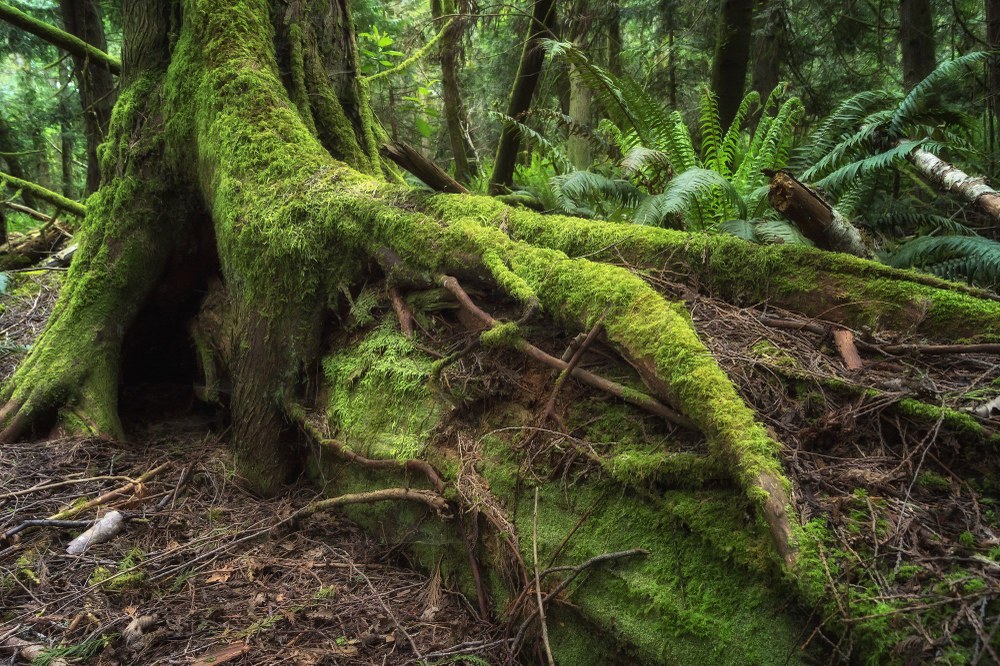
I watched in fascinated disgust as dozens of insects squirmed and wriggled towards the edges of the bark where it met the soft damp core, searching for darkness and safety. Just moments before, my mother in an effort to teach me about the wonders of nurse logs had wedged her fingernail between bark and wood and carefully pried off a chunk of bark the size of her hand. “All those insects make their home in the log. They eat the wood and make it into soil so other trees can grow.” Then she replaced the bark as carefully as she had removed it. “Let’s not disturb them any further.”
I was 24 when the nightmares started. My mother would come
to me in my dreams, reaching out to hold me; to comfort me.
The corners of her mouth pushing her cheeks upward into the
smile she reserved for her beloved children. I would turn from
her, not in fright, but in anger to scream “You’re dead! You’re
dead! You’re dead!” Once I awoke, the tears would return.
I was 24 when my mother died after a long and debilitating
struggle with diabetes. In the end, she was tired and in pain,
her organs shutting down one by one – her pancreas, her liver,
her kidneys, her heart. In the end, the doctors could no longer
stabilize her insulin. In the end, she was gone. When she was
gone, I realized how much of my self had been filled by her –
her smile, her hugs, her love, her strength.
My confidant was gone, and with her my ability to make
decisions. Gone also was her steadying hand and so too was my
ability to stand upright and stand my ground. Her encouraging
words disappeared and my motivation to achieve disappeared
with them. As a young adult, I needed my mother still and she
was not there. She wasn’t there to walk through the woods
with me where we would marvel at the rejuvenating beauty of the forest. In time, the forest began to close in around me – I
felt claustrophobic and lost, gasping for breath in a place that
was once so comforting to my inquisitive mind.
In time the nightmares stopped as did the feeling of being
smothered by the trees. I began to take refuge in the woods
once more, to admire the intricate interconnections of the
forest. The birds, moss, ferns, insects, even the fallen trees
bring life to the forest.
Stopping by a fallen tree rotting next to the trail, the lessons
from far ago spring to mind. I hear my mother explain in her
patient tone the importance of fallen trees becoming nurse
logs. As insects burrow under the bark into the wood, mosses
and lichens begin to grow to help create soil; as a mother
creates nourishment for her children to grow.
Soon, new trees sprout and reach toward the sunlight greedily
held by the high branches of the mature trees. Growing from the higher vantage of a nurse log helps the trees and bushes thrive; as a mother encourages growth towards success for her children.
The roots of the young trees begin to stretch toward the
ground as branches stretch upward. They seem to hug the
nurse log as if asking it not to leave, yet no longer needing the
log for support. As a child begins to leave their mother finding
their own support, their own success.
As the nurse log disappears, it leaves behind a void in the root
structure of the young tree – a tree that has reached the pure
sunlight high in the upper forest. The tree no longer needs
the support of the nurse log, but the evidence of its existence
remains with the young tree – of a tree seemingly standing on
its toes, strong and thriving.
Main image by Heidi Walker.
This article originally appeared in our Spring 2020 issue of Mountaineer Magazine. To view the original article in magazine form and read more stories from our publication, visit our magazine archive.
Add a comment
Log in to add comments.Fantastic piece Heidi - your mother would be proud.
 Heidi Walker
Heidi Walker